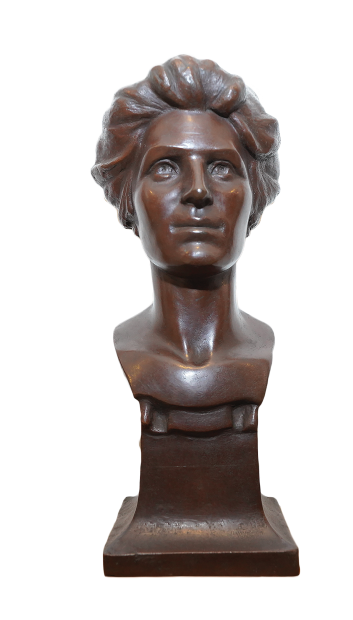The object below is a small bust of Viola Minor Westergaard, the wife of a professor and the only person from the Pomona College community known to have died in the 1918-1919 flu pandemic. Her parents made numerous gifts to the College in her memory, including this bust by artist Burt Johnson, kept on display in the Special Collections Reading Room of The Claremont Colleges Library.
 Born in San Francisco, Viola Minor was the daughter of Danish immigrant Capt. Robert Minor, a pioneer of the Pacific shipping industry, and his wife Hansine. Viola married Waldemar Westergaard, a professor of history at Pomona, on August 21, 1917.
Born in San Francisco, Viola Minor was the daughter of Danish immigrant Capt. Robert Minor, a pioneer of the Pacific shipping industry, and his wife Hansine. Viola married Waldemar Westergaard, a professor of history at Pomona, on August 21, 1917.
The couple lived in an apartment in Smiley Hall during their first year of marriage, on at least one occasion chaperoning a group of young men on an outing to nearby Live Oak Canyon. They later moved to a cottage on Ninth Street.
Much admired among what was once called the faculty circle, the young Mrs. Westergaard was described in contemporary accounts as someone of “choice spirit … with a genuine thoughtfulness of others.”
Although World War I ended in November 1918, a worldwide flu epidemic first identified in the U.S. among military personnel took hold, tempering the celebration. Unlike the early stages of the COVID pandemic, the virus often struck down the young and the fit.
On a Christmas visit to Northern California to visit her parents, Viola fell ill and died at her parents’ home in Alameda on January 7, 1919, at the age of 30 years, 11 months and 24 days. Hers was one of an estimated 675,000 U.S. deaths, a figure now surpassed by COVID.
Viola’s widower, Prof. Westergaard, moved on to UCLA in 1925 and taught there until 1949, specializing in Scandinavian and European history. He did not remarry until 1941 and died in 1963.
Viola’s parents made the first of many gifts to Pomona in her memory the year she died, a collection of valuable art books and pictures first kept in Rembrandt Hall.
They continued to contribute valuable items throughout their lives and Capt. Minor left $25,000—about $500,000 in today’s dollars—on his death in 1934, as did his wife in her will.
